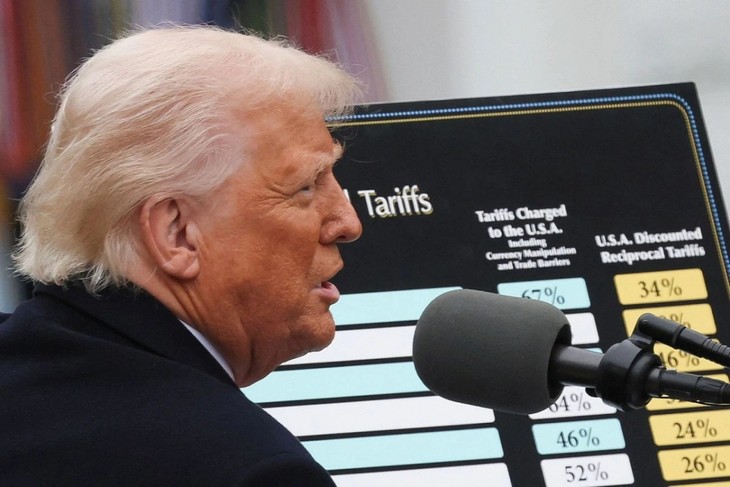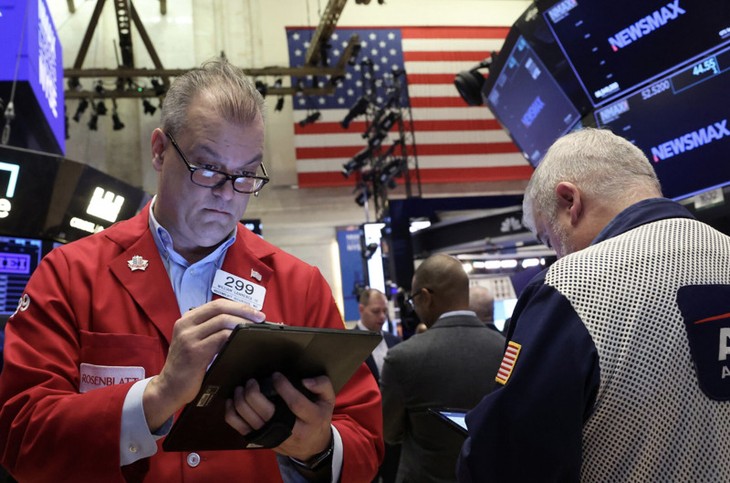(VOVWORLD) - US President Donald Trump on Wednesday announced reciprocal tariffs on more than 180 of the US’s trading partners. His announcement triggered major shocks across global markets and raised concerns about heightened instability in the global economy.
 President Trump announces reciprocal tariffs on April 2, 2025. (Photo: Reuters) President Trump announces reciprocal tariffs on April 2, 2025. (Photo: Reuters) |
On Saturday Trump will impose a 10% universal tariff on all imported goods and, starting next Wednesday, reciprocal tariffs as high as 49% on specific countries.
Global economic shock
Most of the US's major trading partners are facing high tariff rates. For example, Chinese imports will be subject to an additional 34% tariff on top of the 20% imposed in March, bringing the total to 54%. The EU will be taxed 20%, Japan 24%, and South Korea 26%. Many developing economies are also subject to steep tariffs ranging from 30% to 49%.
The US’s trade policy caused an immediate global shock, reflected in sharp declines in stock markets. Observers say Trump’s nearly universal tariffs are the most significant shift in US trade policy in decades, and could accelerate the formation of a new global economic order.
“President Trump's announcement of universal tariffs on the whole world is a major blow to the world economy. The global economy will massively suffer. Uncertainty will spiral and trigger the rise of further protectionism. The tariffs will also hurt consumers around the world. Millions of citizens will face higher grocery bills,” President of the European Commission Ursula von der Leyen said.
Professor Thomas Bridges of the University of Delaware says the current global economy is built on a high degree of labor specialization, where each country focuses on its strengths and complements the others through free trade. The US’s new tariffs on nearly every country will disrupt that economic foundation, which the US itself helped to build over the past several decades.
“Being no barriers to trade makes the economy more efficient and provides solid foundations. My concern would be that if these tariffs are long-lasting, it could have quite significant effects on the foundation of global economies.”
 The New York Stock Exchange on April 3, 2025. (Photo: Reuters) The New York Stock Exchange on April 3, 2025. (Photo: Reuters) |
A shock for US
Trump’s tariffs have also caused disruption at home. On Thursday, the New York Stock Exchange (NYSE) recorded its worst trading day in five years, with major indexes — the S&P 500, Dow Jones, and Nasdaq — plunging between 4% and 5.9%, erasing more than 2.5 trillion USD in market capitalization.
“The American people are going to see price rise…Prices are going to rise most on the goods that we appreciate and need the most,” Maurice Obstfeld, a senior fellow at the Peterson Institute for International Economics, said.
Many economists say that, while some US industries may benefit in the short term from the new tariff policy, in the long run the competitiveness of American businesses, such as those in the automotive and energy sectors, will suffer due to rising costs of imported materials and components. Trump’s major goal of reshoring production to the US remains uncertain, as restructuring global supply chains may take longer than his presidential term.
Observers believe these reciprocal tariffs are Trump’s way of putting pressure on trade partners before negotiations to reduce the US trade deficit. US Commerce Secretary Howard Lutnick said Thursday that the US government will negotiate with all major trade partners on the new tariffs. He said that, in order to mitigate the tariffs, countries will have to revise their trade rules to increase imports of US goods.